Unit10 知识要点解析
九年级英语上册unit10知识要点
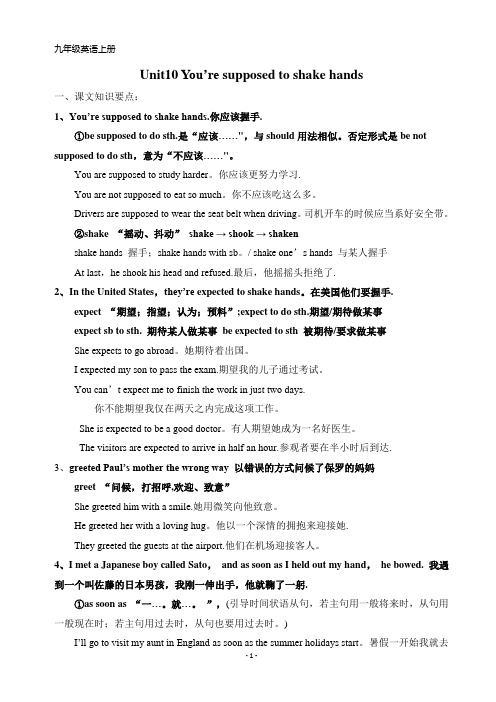
九年级英语上册Unit10 You’re supposed to shake hands一、课文知识要点:1、You’re supposed to shake hands.你应该握手.①be supposed to do sth.是“应该……",与should用法相似。
否定形式是be not supposed to do sth,意为“不应该……"。
You are supposed to study harder。
你应该更努力学习.You are not supposed to eat so much。
你不应该吃这么多。
Drivers are supposed to wear the seat belt when driving。
司机开车的时候应当系好安全带。
②shake “摇动、抖动”shake → shook → shakenshake hands 握手;shake hands with sb。
/ shake one’s hands 与某人握手At last,he shook his head and refused.最后,他摇摇头拒绝了.2、In the United States,they’re expected to shake hands。
在美国他们要握手.expect “期望;指望;认为;预料”;expect to do sth.期望/期待做某事expect sb to sth. 期待某人做某事be expected to sth 被期待/要求做某事She expects to go abroad。
她期待着出国。
I expected my son to pass the exam.期望我的儿子通过考试。
You can’t expect me to finish the work in just two days.你不能期望我仅在两天之内完成这项工作。
She is expected to be a good doctor。
Unit10-If-you-go-to-the-party知识点归纳
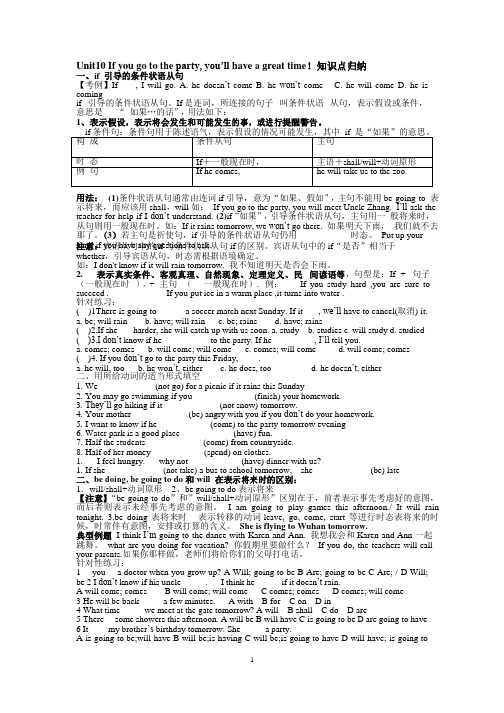
Unit10 If you go to the party, you’ll have a great time !知识点归纳 一、if 引导的条件状语从句【考例】If____, I will go. A. he doesn ’t come B. he won’t come C. he will come D. he is coming if 引导的条件状语从句。
If 是连词,所连接的句子 叫条件状语 从句,表示假设或条件, 意思是 “ 如果…的话”,用法如下:1、表示假设,表示将会发生和可能发生的事,或进行提醒警告。
注意:宾语从句中的 if 与条件状语从句 if 的区别。
宾语从句中的 if “是否”相当于 whether ,引导宾语从句,时态需根据语境确定。
如:I don't know if it will rain tomorrow. 我不知道明天是否会下雨。
2. 表示真实条件、客观真理、自然现象、定理定义、民 间谚语等,句型是:If + 句子 (一般现在时 ),+ 主句 ( 一般现在时). 例: If you study hard ,you are sure to succeed . If you put ice in a warm place ,it turns into water . 针对练习:( )1There is going to ______a soccer match next Sunday. If it ___, we’ll have to cancel(取消) it. a. be; will rain b. have; will rain c. be; rains d. have; rains ( )2.If she ___harder, she will catch up with us soon. a. study b. studies c. will study d. studied ( )3.I don’t know if he __________ to the party. If he _________, I’ll tell you. a. comes; comes b. will come; will come c. comes; will come d. will come; comes ( )4. If you don’t go to the party this Friday, ____. a. he will, too b. he won ’t, either c. he does, too d. he doesn ’t, either 二、用所给动词的适当形式填空1. We ____________ (not go) for a picnic if it rains this Sunday2. You may go swimming if you _____________ (finish) your homework.3. They’ll go hiking if it ____________ (not snow) tomorrow.4. Your mother ____________ (be) angry with you if you don’t do your homework.5. I want to know if he ___________ (come) to the party tomorrow evening6. Water park is a good place ___________ (have) fun.7. Half the students ____________ (come) from countryside.8. Half of her money ___________ (spend) on clothes. 1.- ---I feel hungry. ----why not ___________ (have) dinner with us? 1. If she ____________ (not take) a bus to school tomorrow, she ____________ (be) late 二、be doing, be going to do 和 will 在表示将来时的区别:1.will/shall+动词原形 2、be going to do 表示将来 【注意】“be going to do ”和”will/shall+动词原形”区别在于,前者表示事先考虑好的意图, 而后者则表示未经事先考虑的意图。
unit10知识点讲解

知识点讲解:P63 ,3a:1, or (1) “或者”,连词,用来连接并列的单词或词组,表示选择关系。
Is he your brother or your friend?(2) 在否定句和疑问句中替换and.2, then 然后,He speaks English, and then he plays the piano.3, be in 相当于join, 加入到…中, 成为…中的一员I want to be in the school trip.Tom is in the swimming club.4, call sb. at …P63, 41, show 1) 名词,演出,表演。
school show 学校公演be on show …在展览中The photos are on show.2)动词,给…看,出示show sb. sth. = show sth. to sb.Please show me your watch. = Please show your watch to me.2, do Chinese kung fu 表演中国功夫3, Sunday 星期天,是一周的第一天,在星期天on Sunday;这个星期天this Sunday (之前不加on)4, pm\p.m. 指下午;am\a.m. 指上午,均放在具体时间之后。
P64, 31, May I know your name? 你叫什么名字?(语气更委婉,更有礼貌)= May I have your name? = What’s your name?may 情态动词,可以。
You may go now.2, draw 动词,画画。
draw a cat3, a little (1) 修饰动词,“一点”,放在动词之后,做状语。
反义短语a lot.I know a little/a lot about the boy.(2) 修饰不可数名词,“一些”,放在不可数名词之前。
七年级英语下册unit10知识点

七年级英语下册unit10知识点Unit10是七年级英语下册中的一个重要单元,本单元主要涉及到的内容是形容词比较级和最高级、时间状语从句以及一些有关旅游和交通的话题。
本文将对这些知识点进行详细的介绍和解释。
一、形容词比较级和最高级1.比较级的用法形容词比较级通常用于两个人或物之间的比较。
它的构成方法是在单音节形容词后面加-er,如big-bigger,而对于多音节形容词则需要在前面加more,如beautiful-more beautiful。
除了例外单词(如good-better,bad-worse)外,大部分比较级都需要在后面加than才能完整的表示比较。
2.最高级的用法形容词最高级通常用于三个或以上的人或物之间的比较。
它的构成方法是在单音节形容词后面加-est,如tall-tallest,而对于多音节形容词则需要在前面加most,如interesting-most interesting。
通常来说,最高级也需要在前面加the才能完整的表示最高级。
3.注意点在使用比较级和最高级的时候,我们需要注意以下几点:①要根据句子的语境选择正确的形容词比较级或最高级。
②如果比较级或最高级前面有限定词(如a,an,the等),则需要加在限定词后面。
③在描述人的特征时,注意要表达恰当。
例如正确的表达是Tom is taller than me,而不是Tom is taller than I。
二、时间状语从句时间状语从句通常用于表示某个动作或事件发生的时间。
这类从句可以分为以下几种:1. before/after从句此类从句表示某个动作发生在另一个动作之前或之后,其构成方法如下:before从句:Subject + verb (simple past) + beforeAfter从句:Subject + verb (simple past) + after例如:Before I went to bed, I finished my homework.2. when从句当我们想要表示某个动作的发生时间时,可以使用when从句。
八年级英语上册“Unit 10”必背知识点

八年级英语上册Unit 10 If you go to the party,you'll have a greattime!必背知识点一、重点词汇1. 动词和名词organize (v.) 组织;organization (n.) 组织,机构travel (v.) 旅行;travel (n.) 旅行advise (v.) 劝告,建议;advice (n.) 建议upset (adj./v.) 难过,失望;使心烦意乱experience (n.) 经验;经历(过去式experienced)2. 形容词和副词normal (adj.) 正常的worried (adj.) 担心的careful (adj.) 小心的angry (adj.) 发怒的understanding (adj.) 善解人意的certainly (adv.) 无疑,当然3. 其他meeting (n.) 会议,集会video (n.) 录像带chocolate (n.) 巧克力taxi (n.) 出租汽车teenager (n.) 青少年mistake (n.) 错误二、重点短语1. 动词短语have a great time 玩得开心order food 订餐stay at home 呆在家watch a video 看录像make mistakes 犯错误travel around the world 周游世界give sb. advice 给某人建议solve the problem 解决问题cut ... in half 把……切成两半2. 介词短语have problems with ... 在……方面有问题be worried about ... 为……担心keep ... to oneself 保守秘密be angry with ... 对……生气have enough time to do sth. 有足够的时间做某事3. 其他常用短语too ... to ... 太……而不能……in the end 最后,终于step by step 一步一步地half the class 一半的学生三、重要语法1. 条件状语从句当主句用一般将来时时,从句用一般现在时表示将来。
人教版英语八年级unit10知识点全解
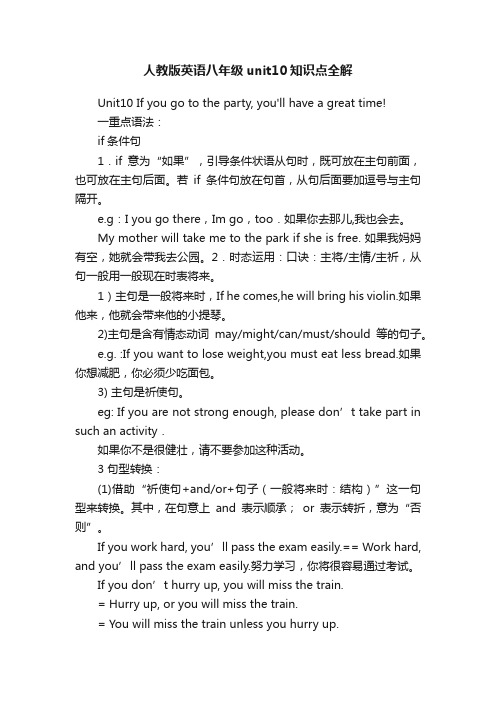
人教版英语八年级unit10知识点全解Unit10 If you go to the party, you'll have a great time!一重点语法:if条件句1.if意为“如果”,引导条件状语从句时,既可放在主句前面,也可放在主句后面。
若if条件句放在句首,从句后面要加逗号与主句隔开。
e.g:I you go there,Im go,too.如果你去那儿,我也会去。
My mother will take me to the park if she is free. 如果我妈妈有空,她就会带我去公园。
2.时态运用:口诀:主将/主情/主祈,从句一般用一般现在时表将来。
1)主句是一般将来时,If he comes,he will bring his violin.如果他来,他就会带来他的小提琴。
2)主句是含有情态动词may/might/can/must/should等的句子。
e.g. :If you want to lose weight,you must eat less bread.如果你想减肥,你必须少吃面包。
3) 主句是祈使句。
eg: If you are not strong enough, please don’t take part in such an activity.如果你不是很健壮,请不要参加这种活动。
3 句型转换:(1)借助“祈使句+and/or+句子(一般将来时:结构)”这一句型来转换。
其中,在句意上and表示顺承;or表示转折,意为“否则”。
If you work hard, you’ll pass the exam easily.== Work hard, and you’ll pass the exam easily.努力学习,你将很容易通过考试。
If you don’t hurry up, you will miss the train.= Hurry up, or you will miss the train.= You will miss the train unless you hurry up.如果你不快点,你会错过火车。
Unit10九年级知识点
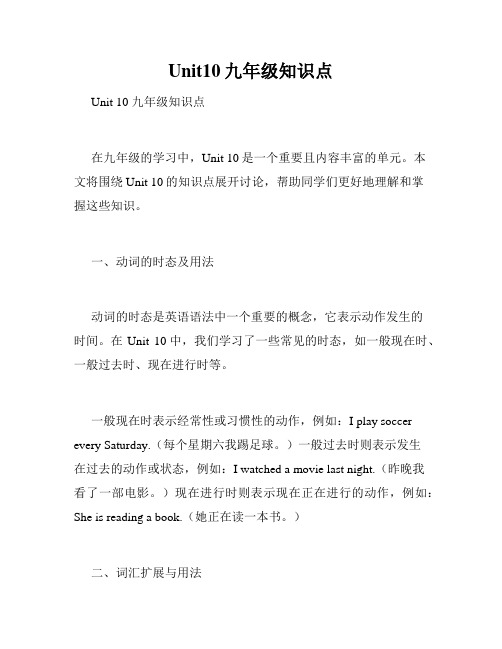
Unit10九年级知识点Unit 10 九年级知识点在九年级的学习中,Unit 10是一个重要且内容丰富的单元。
本文将围绕Unit 10的知识点展开讨论,帮助同学们更好地理解和掌握这些知识。
一、动词的时态及用法动词的时态是英语语法中一个重要的概念,它表示动作发生的时间。
在Unit 10中,我们学习了一些常见的时态,如一般现在时、一般过去时、现在进行时等。
一般现在时表示经常性或习惯性的动作,例如:I play soccer every Saturday.(每个星期六我踢足球。
)一般过去时则表示发生在过去的动作或状态,例如:I watched a movie last night.(昨晚我看了一部电影。
)现在进行时则表示现在正在进行的动作,例如:She is reading a book.(她正在读一本书。
)二、词汇扩展与用法扩充词汇量对于提高英语表达能力非常重要。
Unit 10中,我们学习了一些与旅行相关的词汇,如passport(护照)、destination (目的地)、tourist(游客)等。
掌握这些词汇不仅可以帮助我们更好地理解和阅读英语材料,还能够使我们在旅行中更加流利地交流。
此外,我们还学习了一些常用的短语和表达方式,如keep in touch(保持联系)、have a good time(玩得开心)等。
这些短语和表达方式可以在日常生活和交流中派上用场。
三、被动语态的构成及用法被动语态是英语中的一个重要句式,它用于强调动作的接受者而不是执行者。
在Unit 10中,我们学习了被动语态的构成及用法。
被动语态的构成通常由助动词be加上动词的过去分词形式而成,例如:The book was written by Mark Twain.(这本书是马克·吐温写的。
)被动语态常用于句子中缺少执行者的情况,或者强调动作的接受者的重要性。
四、连词的使用连词在英语中连接或者分割句子,使语言更加流畅。
九年级u10知识点
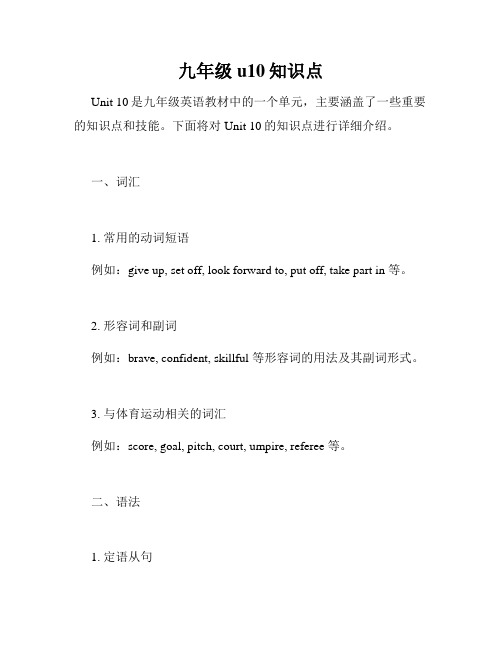
九年级u10知识点Unit 10是九年级英语教材中的一个单元,主要涵盖了一些重要的知识点和技能。
下面将对Unit 10的知识点进行详细介绍。
一、词汇1. 常用的动词短语例如:give up, set off, look forward to, put off, take part in 等。
2. 形容词和副词例如:brave, confident, skillful 等形容词的用法及其副词形式。
3. 与体育运动相关的词汇例如:score, goal, pitch, court, umpire, referee 等。
二、语法1. 定语从句定语从句是一个非常重要的语法结构,它可以修饰名词,并且在句中起到进一步限制或说明的作用。
在定语从句中,我们需要学会选择适当的关系代词或关系副词,并了解其用法。
2. 状语从句状语从句是一个从句,用来修饰句子中的动词、形容词或副词,来表达时间、条件、原因、目的、方式等各种状况。
在学习状语从句时,需了解不同类型的状语从句的使用方法。
3. 被动语态被动语态是英语中常用的一种语态,通过被动语态可以更准确地表达一个动作或事件的发生。
在学习被动语态时,需要掌握其构成、变换方式以及适当的使用场景。
三、阅读理解Unit 10中的阅读理解部分包含了一些关于体育运动、运动员以及运动故事的文章。
学生需要仔细阅读并回答问题,培养他们的阅读理解能力。
四、写作技巧Unit 10中的写作技巧部分主要培养学生撰写与体育相关的文章的能力。
学生需要学会如何运用所学词汇和语法知识,以及如何组织内容,写出连贯、准确的英语短文。
五、口语交际在Unit 10中,学生将通过各种情境对话来进行口语交际。
通过模仿和角色扮演的方式,提高学生的口语表达能力,并培养他们在实际交际中使用所学知识的能力。
六、听力训练Unit 10中的听力训练部分旨在让学生提高听力理解能力。
学生将聆听各种对话和短文,然后完成相关的练习,以检验他们对所听内容的理解程度。
Unit10-I'd-like-some-noodles-知识点1
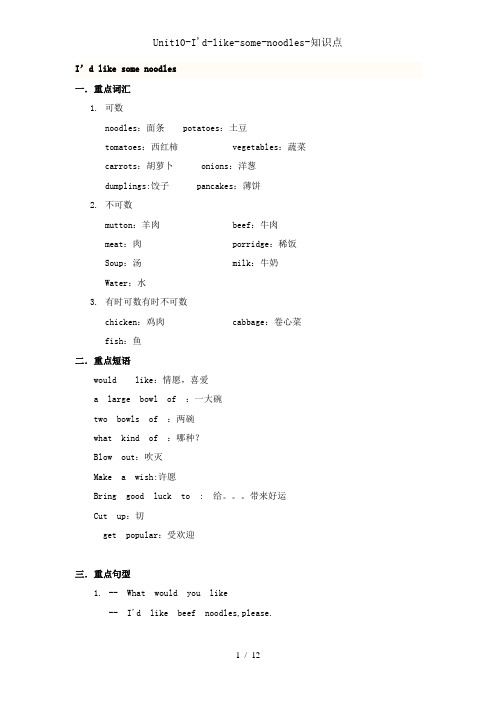
I’d like some noodles一.重点词汇1.可数noodles:面条potatoes:土豆tomatoes:西红柿vegetables:蔬菜carrots:胡萝卜onions:洋葱dumplings:饺子pancakes:薄饼2.不可数mutton:羊肉beef:牛肉meat:肉porridge:稀饭Soup:汤milk:牛奶Water:水3.有时可数有时不可数chicken:鸡肉cabbage:卷心菜fish:鱼二.重点短语would like:情愿,喜爱a large bowl of :一大碗two bowls of :两碗what kind of :哪种?Blow out:吹灭Make a wish:许愿Bring good luck to : 给。
带来好运Cut up:切get popular:受欢迎三.重点句型1.-- What would you like-- I'd like beef noodles,please.2.--What kind of noodles would you like-- I'd like the beef noodles, please.3.May I take your order 我能拿走你的菜单吗?4.--What size would you like 你想要多大的?--I’d like a large bowl, please.5.--Is there any meet in the tomato and egg soupNo, there isn’t any.四.重点知识1、Would like的用法2.1would like 意为想要,情愿,相当于want,用于提出要求或建议;但语气比want委婉,一般有一下三种形式:①would like sth. 想要某物后接名词不加to如:我想要些冰淇淋I would like some ice cream.②would like to do sth. 想要干某事后跟动词,加to如:我想要和你一起去。
九年级英语Unit10 课文重难点知识点详细讲解
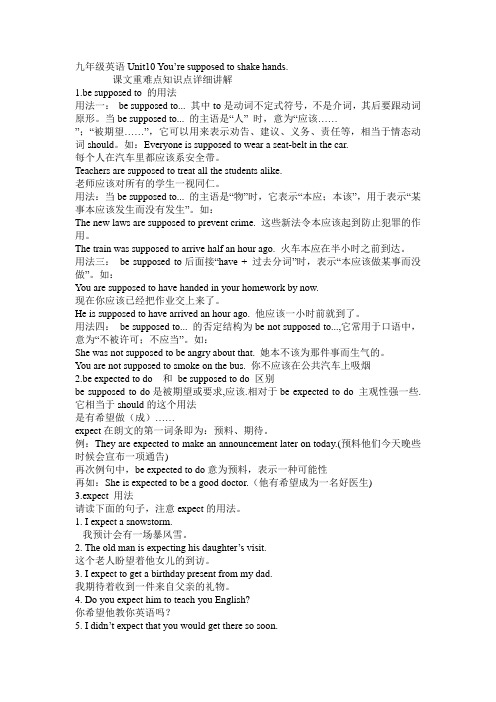
九年级英语Unit10 You‟re supposed to shake hands.课文重难点知识点详细讲解1.be supposed to 的用法用法一:be supposed to... 其中to是动词不定式符号,不是介词,其后要跟动词原形。
当be supposed to... 的主语是“人” 时,意为“应该……”;“被期望……”,它可以用来表示劝告、建议、义务、责任等,相当于情态动词should。
如:Everyone is supposed to wear a seat-belt in the car.每个人在汽车里都应该系安全带。
Teachers are supposed to treat all the students alike.老师应该对所有的学生一视同仁。
用法:当be supposed to... 的主语是“物”时,它表示“本应;本该”,用于表示“某事本应该发生而没有发生”。
如:The new laws are supposed to prevent crime. 这些新法令本应该起到防止犯罪的作用。
The train was supposed to arrive half an hour ago. 火车本应在半小时之前到达。
用法三:be supposed to后面接“have + 过去分词”时,表示“本应该做某事而没做”。
如:You are supposed to have handed in your homework by now.现在你应该已经把作业交上来了。
He is supposed to have arrived an hour ago. 他应该一小时前就到了。
用法四:be supposed to... 的否定结构为be not supposed to...,它常用于口语中,意为“不被许可;不应当”。
如:She was not supposed to be angry about that. 她本不该为那件事而生气的。
Unit10重要知识点讲解2021-2022学年人教版九年级英语
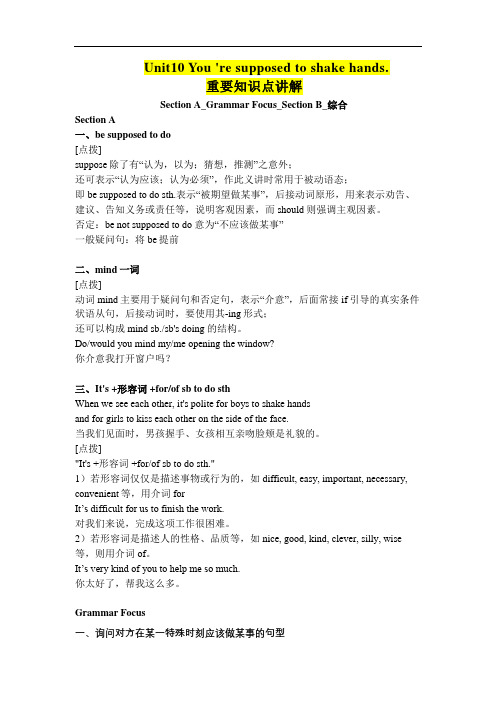
Unit10 You 're supposed to shake hands.重要知识点讲解Section A_Grammar Focus_Section B_综合Section A一、be supposed to do[点拨]suppose除了有“认为,以为;猜想,推测”之意外;还可表示“认为应该;认为必须”,作此义讲时常用于被动语态;即be supposed to do sth.表示“被期望做某事”,后接动词原形,用来表示劝告、建议、告知义务或责任等,说明客观因素,而should则强调主观因素。
否定:be not supposed to do 意为“不应该做某事”一般疑问句:将be提前二、mind一词[点拨]动词mind主要用于疑问句和否定句,表示“介意”,后面常接if引导的真实条件状语从句,后接动词时,要使用其-ing形式;还可以构成mind sb./sb's doing 的结构。
Do/would you mind my/me opening the window?你介意我打开窗户吗?三、It's +形容词 +for/of sb to do sthWhen we see each other, it's polite for boys to shake handsand for girls to kiss each other on the side of the face.当我们见面时,男孩握手、女孩相互亲吻脸颊是礼貌的。
[点拨]"It's +形容词 +for/of sb to do sth."1)若形容词仅仅是描述事物或行为的,如difficult, easy, important, necessary, convenient等,用介词forIt’s difficult for us to finish the work.对我们来说,完成这项工作很困难。
九年级英语Unit10You’resupposedtoshakehands.课文重难点知识点详细讲解[1]解读
![九年级英语Unit10You’resupposedtoshakehands.课文重难点知识点详细讲解[1]解读](https://img.taocdn.com/s3/m/6ec6289ed4d8d15abe234ee6.png)
Unit10 You’re supposed to shake hands.Section A1.In your country, what are you supposed to do when you meet someone for the first time?在你们国家,当你第一次见到某人的时候你应该做什么?【解析】be supposed to do sth 被期望做某事,应该做......1)当主语是人时,表示劝告、建议、责任等,=should =“to be expected to do sth,You are supposed to___________( arrive) on time2)当主语是物时,表示“本应;本该”The train was supposed to arrive half an hour ago.【拓展】:be supposed to 与should(1)be supposed是suppose一词的___________ 语态结构。
后接动词不定式,相当于___________ .后接不定式.即:_______________ . 使用较随便,建议性强否定式为be not supposed to do sth.()To keep safe, drivers aren’t supposed to drink before driving.A. aren’t willing toB. shouldn’tC. aren’t sure toD. don’t have to(2)should后接动词______ ,属于_______ 语态形式,使用起来较严肃和正式;You are not supposed to shake hands. = You shouldn’t shake hands.你不应与之握手。
【2012贵州贵阳】“Henry, you ______ tell the teacher if you want to go out of the classroom.”“Sorry, sir.”A. are supposed toB. are surprised toC. are afraid to【2013山东菏泽】8. You are _____to type quickly when talking to each other on QQ so the other person doesn't get bored A. suggested B. supportedC. taughtD. Supposed【2013黑龙江绥化】29. You are supposed to ________ smoking, ________ you will get ill.A. go on; soB. give up; or C stop; so【2014黔西南州】27. The students ought to wear school uniforms when they’re at school.A. are supposed toB. are allowed toC. would like toD. love to 【2014云南昆明】29. We are supposed to ___________a solution to stop people from looking down at their mobile phones while driving cars.A. come up withB. come formC. come outD. come true 【解析2】for the first time 首先,第一次【辨析】at first/first of all(1) at first = at the beginning 最初,开始【强调在时间顺序或做某事过程等开始之初】(2) first of all 首先,第一【表明陈述事情的重要性】( ) When you want to work for our country in the future, ____, we should have strong body and rich knowledge.A. at firstB. first of allC. for the first timeD. after all【山东德州】We can do a lot to stay healthy. ____ , we should eat a balanced(平衡的) diet.A. At a timeB. In factC. First of allD. All together【有关time的短语】A. firstB. oneC. onceD. firstly【2014贵州六盘水】24. Children always have a good time at the Wetland Park(湿地公园) of Liu Panshui.A. enjoy themselvesB. help each otherC. look beautifulD. have a big dinner()② People in China ________when they meet for the first time.A. bowB. kissC. shake handsD. laugh【新疆】You’re supposed to shake ______ (hand) when you meet your friends.( ) ②—Do you think our football team will win the match? —Yes, we have better players. so I ___them to win.A. hopeB. askC. helpD. expect【2013山东青岛】14. — You look sad. What has happened? —Everyone ______ us to win the match, but we lost.A. expectsB. expectedC. hopesD. Hoped【2013 湖北黄冈】30. Speak slowly, Mr. Wang. I can’t follow you.D. expect希望全班同学参加讨论。
九年级Unit10重难点知识(超全)
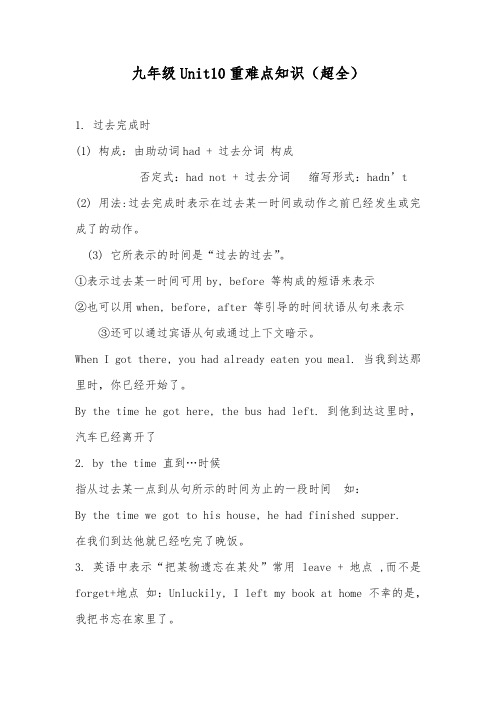
九年级Unit10重难点知识(超全)1. 过去完成时(1) 构成:由助动词had + 过去分词构成否定式:had not + 过去分词缩写形式:hadn’t (2) 用法:过去完成时表示在过去某一时间或动作之前已经发生或完成了的动作。
(3) 它所表示的时间是“过去的过去”。
①表示过去某一时间可用by, before 等构成的短语来表示②也可以用when, before, after 等引导的时间状语从句来表示③还可以通过宾语从句或通过上下文暗示。
When I got there, you had already eaten you meal. 当我到达那里时,你已经开始了。
By the time he got here, the bus had left. 到他到达这里时,汽车已经离开了2. by the time 直到…时候指从过去某一点到从句所示的时间为止的一段时间如:By the time we got to his house, he had finished supper.在我们到达他就已经吃完了晚饭。
3. 英语中表示“把某物遗忘在某处”常用 leave + 地点 ,而不是forget+地点如:Unluckily, I left my book at home不幸的是,我把书忘在家里了。
4. close v. 关 adv. 接近地靠近地 closed adj. 关的5. come out 出来6. on time 按时准时既不早也不迟 in time 及时指在时限到来之前7. luckily adv. 幸运地 lucky adj. 幸运的 luck n. 好运8. give sb. a ride 让某搭便车如:He often gives me a ride to school. 他经常让我搭便车去学校。
9.only just 刚刚好、恰好10. go off (闹钟)闹响 The alarm went off just now. 刚才警钟响了。
Unit10You’resupposedtoshakehands知识点及练习题
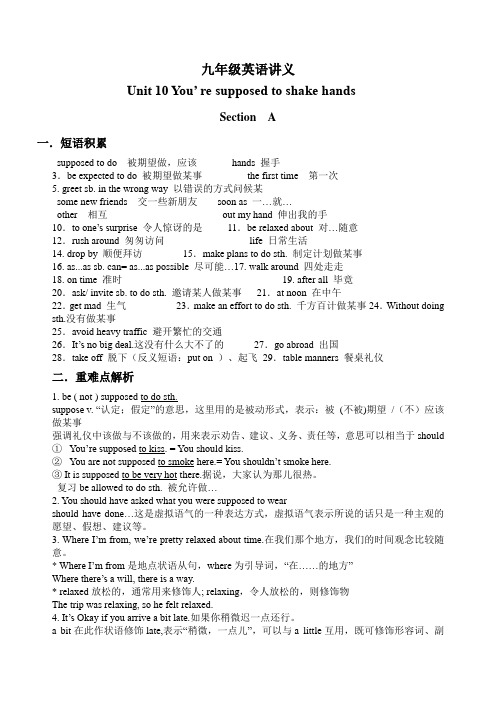
九年级英语讲义Unit 10 You’ re supposed to shake handsSection A一.短语积累supposed to do 被期望做,应该hands 握手3.be expected to do 被期望做某事the first time 第一次5. greet sb. in the wrong way 以错误的方式问候某some new friends 交一些新朋友soon as 一…就…other 相互out my hand 伸出我的手10.to one’s surprise 令人惊讶的是11.be relaxed about 对…随意12.rush around 匆匆访问life 日常生活14. drop by 顺便拜访15.make plans to do sth. 制定计划做某事16. as...as sb. can= as...as possible 尽可能…17. walk around 四处走走18. on time 准时19. after all 毕竟20.ask/ invite sb. to do sth. 邀请某人做某事21.at noon 在中午22.get mad 生气23.make an effort to do sth. 千方百计做某事24.Without doing sth.没有做某事25.avoid heavy traffic 避开繁忙的交通26.It’s no big deal.这没有什么大不了的27.go abroad 出国28.take off 脱下(反义短语:put on )、起飞29.table manners 餐桌礼仪二.重难点解析1. be ( not ) supposed to do sth.suppose v. “认定;假定”的意思,这里用的是被动形式,表示:被(不被)期望/(不)应该做某事强调礼仪中该做与不该做的,用来表示劝告、建议、义务、责任等,意思可以相当于should①You’re supposed to kiss. = You should kiss.②You are not supposed to smoke here.= You shouldn’t smoke here.③ It is supposed to be very hot there.据说,大家认为那儿很热。
九年级英语Unit10 重点、难点、考点及疑点注释
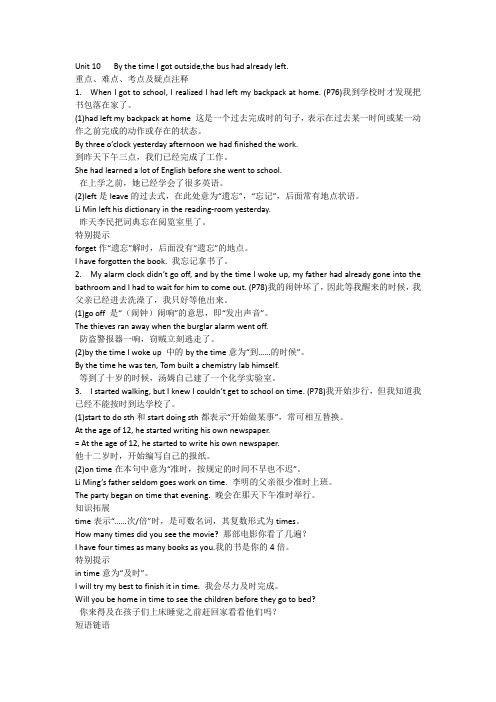
Unit 10 By the time I got outside,the bus had already left.重点、难点、考点及疑点注释1. When I got to school, I realized I had left my backpack at home. (P76)我到学校时才发现把书包落在家了。
(1)had left my backpack at home 这是一个过去完成时的句子,表示在过去某一时间或某一动作之前完成的动作或存在的状态。
By three o’cloc k yesterday afternoon we had finished the work.到昨天下午三点,我们已经完成了工作。
She had learned a lot of English before she went to school.在上学之前,她已经学会了很多英语。
(2)left是leave的过去式,在此处意为“遗忘”,“忘记”,后面常有地点状语。
Li Min left his dictionary in the reading-room yesterday.昨天李民把词典忘在阅览室里了。
特别提示forget作“遗忘”解时,后面没有“遗忘”的地点。
I have forgotten the book. 我忘记拿书了。
2. My alarm clock didn’t go off, and by the time I woke up, my father had already gone into the bathroom and I had to wait for him to come out. (P78)我的闹钟坏了,因此等我醒来的时候,我父亲已经进去洗澡了,我只好等他出来。
(1)go off 是“(闹钟)闹响”的意思,即“发出声音”。
The thieves ran away when the burglar alarm went off.防盗警报器一响,窃贼立刻逃走了。
七年级英语unit10知识点
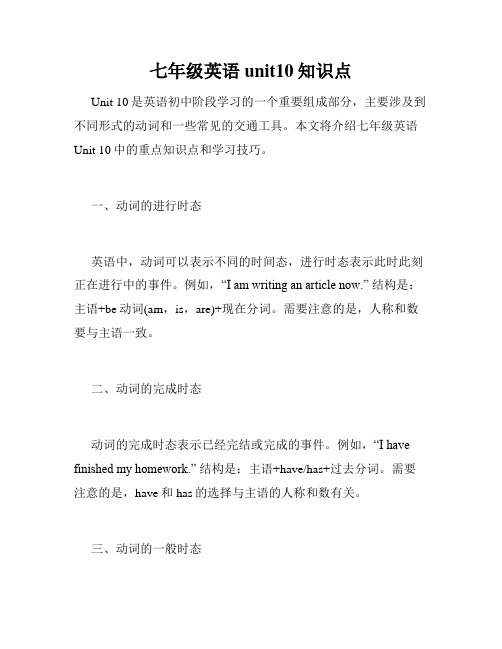
七年级英语unit10知识点Unit 10是英语初中阶段学习的一个重要组成部分,主要涉及到不同形式的动词和一些常见的交通工具。
本文将介绍七年级英语Unit 10中的重点知识点和学习技巧。
一、动词的进行时态英语中,动词可以表示不同的时间态,进行时态表示此时此刻正在进行中的事件。
例如,“I am writing an article now.” 结构是:主语+be动词(am,is,are)+现在分词。
需要注意的是,人称和数要与主语一致。
二、动词的完成时态动词的完成时态表示已经完结或完成的事件。
例如,“I have finished my homework.” 结构是:主语+have/has+过去分词。
需要注意的是,have和has的选择与主语的人称和数有关。
三、动词的一般时态动词的一般时态表示经常或平常发生的事件,也可以表示真理或习惯。
例如,“She always drinks tea in the afternoon.”结构是:主语+动词原形+其他。
四、交通工具交通工具是生活中不可缺少的一部分,也是七年级英语Unit 10的重要内容。
常见的交通工具包括汽车,火车,自行车和飞机等。
掌握这些交通工具的单词和用法可以帮助你更好地理解和应用英语。
五、学习技巧学习英语需要一定的技巧和方法。
以下是一些有用的学习技巧:1. 多听多说多读多写。
用英语学习英语是最有效的方法,尤其是在口语和听力方面。
2. 坚持每天学习。
英语学习是一个长期的过程,需要坚持不懈的努力。
3. 注重语法和单词。
语法和单词是英语学习的基础。
4. 多练习。
练习是掌握英语的关键,可以通过口语交流,写作练习和听力考试来提高英语能力。
5. 积极参与课堂教学。
课堂是学习英语的重要场所,可以通过课堂教学认识到英语学习的重点和难点。
六、总结七年级英语Unit 10是英语学习过程中重要的一部分,涉及动词时态和交通工具等方面。
通过掌握这些知识点和学习技巧,可以提高英语能力和应用能力,更好地实现语言交流和应用。
Unit 10 知识梳理
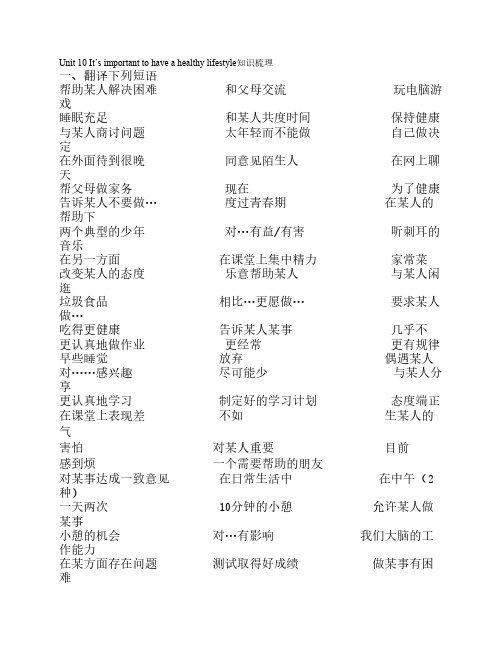
Unit 10 It’s important to have a healthy lifestyle知识梳理一、翻译下列短语帮助某人解决困难 和父母交流 玩电脑游戏睡眠充足 和某人共度时间 保持健康与某人商讨问题 太年轻而不能做 自己做决定在外面待到很晚 同意见陌生人 在网上聊天帮父母做家务 现在 为了健康告诉某人不要做… 度过青春期 在某人的帮助下两个典型的少年 对…有益/有害 听刺耳的音乐在另一方面 在课堂上集中精力 家常菜改变某人的态度 乐意帮助某人 与某人闲逛垃圾食品 相比…更愿做… 要求某人做…吃得更健康 告诉某人某事 几乎不更认真地做作业 更经常 更有规律早些睡觉 放弃 偶遇某人对……感兴趣 尽可能少 与某人分享更认真地学习 制定好的学习计划 态度端正在课堂上表现差 不如 生某人的气害怕 对某人重要 目前感到烦 一个需要帮助的朋友对某事达成一致意见 在日常生活中 在中午(2种)一天两次 10分钟的小憩 允许某人做某事小憩的机会 对…有影响 我们大脑的工作能力在某方面存在问题 测试取得好成绩 做某事有困难最好不要做… 一直做某事 在固定的时间…的数量 因人而异 不到8小时在白天 大量的研究 为了二、翻译下列句子1. 拥有健康的生活方式是很重要的。
2.我认为对青少年来说与某个人商量问题是很重要的。
3. 锻炼有助于青少年保持健康。
4. 为了健康,青少年需要足够的睡眠。
5. 不过多玩电脑游戏是很重要的。
6. 她太小了,不能自己做决定。
7. 告诉他们不要会见陌生人。
8. 他有一些对自己不太好的习惯。
9. 他们知道要改变坏习惯,什么时候也不算晚。
10. 他们知道,她在学校一直很努力。
11. 我需要找更多时间读书12. 对我来说最重要的事情是吃健康的食品13. 你锻炼越多,你就会变得越健康14. 我已经停止吃垃圾食品了15. 尽量不要吃太多盐或糖16. 尽可能经常地帮助别人摆脱困难17. 要对你的学校生活感兴趣18. 要尽可能少的玩电脑游戏19. 他过去在课堂上表现恶劣20. 我父母想让我吃得更健康21. 我认为他们不如你了解我22. 你能告诉我怎么办么?23. 显然在日常生活中,我们的睡眠越少,我们在日常生活中的表现越差.24.我们所需要的睡眠时间因人而异.Unit10 知识运用1、根据句意和首字母完成单词1. I think it’s important to talk problems o_____ with someone.2. He can’t make a d______ to go to the concert.3. Teenagers should get e_______ sleep every day.4. For middle school students, we should have good h_____.5. Tell the children not to talk with s_______.6. Du Fei and Wang Le are two t______ teenagers.7. Jim doesn’t pay a________ in class, so he is bad at lessons.8. You ’ re so tired .You must get e______ sleep.9. We must have a good a_________ to our study.10. Oh, my god! I didn’t get t _______ the exam.11. The boy is s_________ ill. We must take him to hospital at once.12. Mr. Black told his students not to c________ on the Internet.13. He often h_____ out with friends at weekends, so he can’t finish his homework on time.14. The two friends s________ everything— they had no secrets.15. If you go without sleep, you might have p_____ with your memory.二、用所给词的适当形式填空1. It’s very important _________(change) your attitude.2. My father told me _________(not ,stay) out late.3. In order to be _______(health), teenagers should exercise often.4. We need _______(take )a taxi to go to the train station.5. He got up too late _______(catch) the bus .6.They must play computer games as l________(little) as p________.7. I don’t think they understand me as _______(good)as you can.8 .My parents want me _________(eat) more _______(health)9. I’ m afraid they might ________(be) angry with ______(I) if I talk to______( they)10. My parents don't let _____(I)______(go) out with my friends.三、单项选择1. ---Lucy, could you help me ____the map on the blackboard? We won’t need it. ---With pleasure.A. put downB. put upC. put onD. put away2. You ____be careful with fire when you have a picnic in the forest. It’s too dangerous.A. willB. mustC. canD. may3. ---Our teacher wouldn’t give us the answers to the questions directly.---Why not work them out all by _____?A. themselvesB. himselfC. ourselvesD. myself4. Although I failed four times, my father encouraged me to have a____try.A. secondB. thirdC. fourthD. fifth5. —Sam, our daughter has grown up. Should we do everything forher? —Oh, dear. Let her _________ her own life.A. behaveB. shareC. organizeD. do6. Whatever we do, first, we need to have a right ___ towardseverything. A. ability B. attitude C. memory D. concentrate7. Scientists can’t _________ on why we need to sleepA. dependB. explainC. guideD. agree8. —You look so sleepy. I think you shouldn’t t often stay up.—Yes, I find the less I sleep, _______ I do in the work during the day.A. the moreB. the betterC. the fewerD. the worse9. —Let’s go to the KFC, OK?—We’d better eat junk food _________ possible. It’s not healthy.A. as little asB. as much asC. as often asD. as well as10. Though it’s difficult for me to learn English well, I won‟t _________ because it’s very important.A. give it outB. give up itC. give it upD. give it away11. —Miss Li, I have trouble with my English. What can I do?—Study harder from now on. It’s never ____ late ___ catch up with your classmates.A. too; toB. so; thatC. as; asD. such; that12. David used to prefer junk food._________, with the help of his parents, he eats less such food now.A. ButB. HoweverC. SoD. Or13. —Hi, Would you like to ____ with me in the shopping center?—Certainly, I’d like to.A. help outB. get throughC. hang outD. give out14. —We often talk with each other on QQ.—Really? Will you please show me _________ it?A. what to useB. how to useC. what I can useD. how can I use15. —I think teenagers can go out at night.—_________ . It’s not safe enough.A. I agreeB. I think soC. I don’t knowD. I disagree。
八年级人教英语unit 10知识点

八年级人教英语unit 10知识点Unit 10是八年级人教英语中的一个重要单元,其中包含了许多重要的知识点。
在这篇文章中,我将对Unit 10中的重点知识进行详细的介绍。
一、词汇1. 短语动词短语动词是指由一个动词和一个介词或副词组成的动词短语。
在Unit 10中,我们需要掌握一些常用的短语动词,例如:pick up、look after、take care of、get on等。
2. 形容词和副词的比较级和最高级形容词和副词的比较级和最高级也是本单元的重点内容。
比较级和最高级的构成方式各不相同,需要我们记住相应的规则。
例如,当形容词以辅音字母+y结尾时,要将y变为i,再加-er或-est。
另外,对于比较级和最高级的不规则变化也需要我们掌握。
二、语法1. 现在进行时现在进行时表示现在正在进行的动作,通常由be动词+现在分词构成。
例如:I am writing an article.在Unit 10中,我们需要掌握现在进行时的用法,例如时间状语、否定句和疑问句的构成等。
2. 定语从句定语从句是指在句子中作修饰语的从句,通常用来对某个名词或代词进行修饰。
在Unit 10中,我们需要掌握定语从句的用法,例如关系代词的用法、限定性和非限定性定语从句的区别等。
三、阅读1. 推理阅读推理阅读是指通过阅读文本中的信息,理解作者的意图和推理出一些隐含的信息。
在Unit 10的阅读理解中,我们需要掌握一些推理阅读的技巧,例如根据上下文理解单词的意思、根据细节推断信息等。
2. 策略阅读策略阅读是指通过使用一些阅读策略来提高阅读效率和阅读理解能力。
在Unit 10中,我们需要掌握一些常用的阅读策略,例如预测、扫读和略读等。
以上就是八年级人教英语Unit 10中的重点知识点。
通过学习这些知识点,我们可以提高自己的语言水平,更好地掌握英语。
八年级上英语unit10知识点

八年级上英语unit10知识点Unit10是八年级上英语课的重要单元,掌握好这些知识点可以帮助学生更好地理解和使用英语。
本文将详细介绍Unit10包含的语法和词汇知识点。
1. 一般现在时态(Simple Present Tense)一般现在时态表示现在的状态和行为。
用于第三人称单数时,动词要加s。
例如:- I speak English every day.(我每天说英语。
)- He speaks English every day.(他每天说英语。
)2. 常用的时间状语时间状语可以表示动作发生的时间或者频率,例如:- every day(每天)- every week(每周)- every month(每月)- once a week(每周一次)- twice a month(每月两次)- on weekends(在周末)3. 一般过去时态(Simple Past Tense)一般过去时态表示过去发生的动作和状态。
大多数情况下,动词过去式用-ed结尾。
例如:- I played basketball yesterday.(我昨天打篮球了。
)- She watched a movie last night.(她昨晚看了一场电影。
)4. 可数和不可数名词可数名词有单数和复数两种形式,他们可以具有数字和数量上的概念。
不可数名词没有复数形式,不能用数字表示数量。
例如:- apple(可数名词)- apples(可数名词的复数形式)- water(不可数名词)5. 动词不定式(Infinitive)动词不定式由to+动词原形构成,可以作为名词、形容词或副词的补语。
例如:- I want to go to the park.(我想去公园。
)- She is happy to help us.(她乐意帮我们。
)- She studies hard to get good grades.(她努力学习以取得好成绩。
- 1、下载文档前请自行甄别文档内容的完整性,平台不提供额外的编辑、内容补充、找答案等附加服务。
- 2、"仅部分预览"的文档,不可在线预览部分如存在完整性等问题,可反馈申请退款(可完整预览的文档不适用该条件!)。
- 3、如文档侵犯您的权益,请联系客服反馈,我们会尽快为您处理(人工客服工作时间:9:00-18:30)。
• be worth doing sth 值得做某事,句子主语一般事或物,是do的宾语 • be worth +钱 “值多少钱” • be worth +名词 “值得” • well worth ‘很值得’,不能说 very worth • 【练一练】
_________(握手)with them. • ②当第一次见朋友是,你们应该握手。 • You’re ________ to shake ______ (hand) when you meet your
friends.
3.In the United States, they’re expected to shake hands. 在美国,他们应该握手。
11.If there are people in the meeting room , you are supposed to knock before entering .
• knock v. 敲(门等), 碰撞 • knock at/on the door 敲门 knock into 与......相撞 knock down 撞倒 • 【练一练】用介词at/on,into,down填空 • 1)He knocked ______ the door , but no one answered. • 2)The car knocked ________ the tree last night and the driver hurt. • 3)The boy was knocked ________ by a running bike on the street.
tired.
7.We often just drop by our friends’ homes if we have time.如果我们有时间,我们经常回顺便拜 访朋友家。
• 【解析】 drop by 顺便拜访 可以直接使用,也可以在by后面 drop in on sb. 顺便走访某人= drop by sb.
6.If you tell a friend you’re going to their house for dinner, it’s OK if you arrive a bit late.
• 【拓展】a bit / a little辨析: • 【相同点】a bit 和a little作程度副词修饰形容词、副词、动词或
等开始之初】 • (2) first of all 首先,第一【表明陈述事情的重要性】 • 【练一练】
• (1 ) Do you remember the day when we met for the ___ time? • A. first B. one C. once D. firstly • (2 )他第一次被父母赞扬。这使得他很兴奋。 • He was praised by parents _____ _____ _____ _____. This made her very
• drop in at +地点 = drop by one’s home 拜访…
• 【练一练】
• ① When I return to my hometown, I usually ______________(顺便看望) my old friends.
• ② — Do you often _____your friends’ homes? — Yes, we do
时则相当于not much。
• 【练一练】
• ①. There is _________ time left. • ②. I would like you to stay for _________ if you have time. • ③. This will give us a _________ of time. • *④. He went to sleep soon, for he was not _________ tired. • *⑤. I don't want to stop to have a rest, because I am not _________
• 【解析】greet v.“问候,打招呼”= welcome or say “hello”to • greet sb.with 用....方式向某人问候 greet sb by doing sth 通过做......
问候某人 • 【练一练】 • ①她向我微笑致意。 • She _____me_____ a friendly smile. • ②The girl often greets me _____ a polite nod. • A in B by C with D to
比较级时,意义相同,为“一点儿, 有些”。 • 【不同点】a little可直接修饰名词;而a bit后须加of才可以。 • *否定形式: • not a little 作状语,相当于very / quite, “很, 非常”;作定语和
宾语时,相当于much, 意为 “许多”。 • not a bit 作状语时,相当于not at all, 意为“一点也不”,作宾语
classroom.” “Sorry, sir.” • A. are supposed to B. are surprised to C. are afraid to D are suppose to
• 【解析2】for the first time 首先,第一次 • 【辨析】at first/first of all • (1) at first = at the beginning 最初,开始 【强调在时间顺序或做某事过程
• Workers are_____ _____shut off the machine after work. • ③I expect the group ________(sing) pop songs.
4. greeted Paul’s mother the wrong way 以错误 的方式问候了保罗的妈妈。
homework.
• A. surprised at B. mad at C. excited at • ②老师对我的谎言很生气。
• Teacher was _____ ______ my lies.
10. but it is worth the trouble if you want to understand another culture.但是如果你想理解另 外一种文化,这样的麻烦是值得的。
• 【解析】sb. be expected to do sth.“(某人)被期待做某事,应该做某事 (相当于be supposed to do sth.)”
• 【回顾】expect v预料,期待,期望。 后面接名词,代词或不定式,从句 及以下搭配
• (1) expect to do sth = look forward to doing sth 期待做某事 • (2) expect sb. to do sth 期待某人做某事 • 【拓展】wish , hope和expect 搭配 • ①The boy is expected_______(say) sorry to his mother because of his mistake. • ②工人应该下班后关闭机器。
• A. going B.going by C. going for
9.If you’re even 15 minutes late, your friend may get mad. 如果你迟到15分钟,你的朋友或许会 生气。
• 【解析】get mad 大动肝火;气愤 • 【拓展】mad adj. 很生气;疯的 • be/get mad at/with sb.= be /get angry with sb. 对某人生气 • be/get mad about sth.因某事而生气 • 【练一练】 • ①My mother is angry with me because I didn’t finish the
1.In your country, what are you supposed to do when you meet someone for the first time?
• 【解析】be supposed to do sth. “被期望做某事,应该做.....”表示劝告、 建议、责任等,=should,后接动词原形
• A. drop by B. drop off C. drop at D. drop on
• ③ I often drop ________ my uncle’s home.
• A. by
B. over
C. in
D. in
8. Also, we never visit a friend’s house without calling first.而且,我们从不未通电话便拜访朋 友家
• 【解析】 without prep.无,没有(后跟名词,代词或动词ing) • 【2014福州中考】Don’t go to school _____ breakfast .It’s a bad
habit.
• A. after B. with C. without
• 【2014甘肃白银】Mom always tells me that nothing can be learned without_______through hard work.
• ①. The TV program Super Brain(最强大脑)is so fantastic that it is well worth____ ____ ( watch).
• ②.你给我的这本书非常值得再看一遍。
• The book you gave you is____ _____ _____ again.
